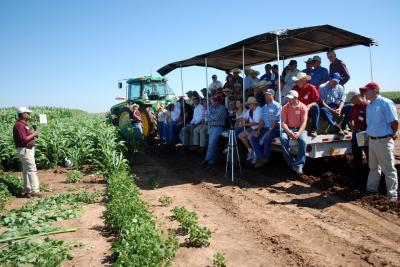Making the most of fewer resources highlights NMSU's Clovis Field Day Aug. 3

As the eastern New Mexico region continues under drought conditions and irrigation sources diminish, it is necessary for area farmers to make the most of costly inputs in order to remain profitable. New technologies for fertilizer application, land preparation, weed control as well as alternative crops will be topics of interest at New Mexico State University's annual field day at the Agricultural Science Center at Clovis Aug. 3.
"This year's event will focus on some of the projects at the science center and at other locations in the region that address the most pressing issue we are facing with agriculture today - water shortages and expensive inputs," said Mark Marsalis, Extension agronomist at the science center. "The purpose of the Clovis field day is to present some new technologies and innovative ideas to agricultural producers for possible integration into their own operations."
In addition, since this is a commemorative year for New Mexico and the land grant university system -- the sesquicentennial of the Morrill Act -- it is important to remember and highlight the importance of agriculture in the region, he added.
A display of both old and new photographs, publications, and other documentation will be available for viewing to give a timeline of the progression of the New Mexico Agricultural Experiment Station through the years.
At the field day, two agri-business individuals, Blake Curtis, owner of Curtis & Curtis Seed; and Hoyt Pattison, a long-time farmer and agricultural advocate, will give a historical overview of how agriculture has changed in eastern New Mexico over the last several decades.
"Blake and Hoyt have very unique perspectives on different aspects of farming and marketing products in New Mexico as their families have been involved in agriculture in the region for many years," Marsalis said.
Marsalis will address two ongoing studies at the Clovis station. The first involves different nitrogen application methods in irrigated and dryland sorghum scenarios. The nitrogen use efficiency study focuses on how best dry and liquid nitrogen sources can be applied to plants so they can utilize both low and high levels of the fertilizer without deficiency or waste.
Marsalis will also discuss a project that is investigating the effects of a relatively new herbicide on forage sorghum crop injury.
"It is uncertain how this weed control option will impact specific types of sorghum, and forage types may have different responses to recommended rates than grain sorghum," he said.
Also, other herbicide industry representatives have been invited to speak on the latest chemical-control options for the different production practices in the region.
Rick Kochenower, area specialist for Oklahoma State University's Panhandle Research and Extension Center, will discuss ongoing research that looks at reduced tillage and strip till practices in sorghum.
"Rick's research and extension efforts focus largely on sorghum production and his vast knowledge of managing dryland sorghum is a valuable resource for our area producers," Marsalis said.
Sangu Angadi, crop stress physiologist with NMSU at Clovis, and Sukhbir Singh, NMSU graduate student, will discuss long-term work investigating the potential of oilseed crops, including canola and safflower, as alternatives or rotational options for farmers. Information will be presented on observed yields under varying water amounts, growing conditions, as well as the pros and cons of adopting alternative crops.
Robert Hagevoort, NMSU Extension dairy specialist, will give a dairy update and discuss the current state of the New Mexico's dairy industry, how low milk prices combined with crop shortages and high feed prices have impacted the industry recently, and give an outlook on how the new farm bill will impact dairy producers.
Soum Sanogo, NMSU fungal plant pathologist, will provide an overview of the current research in New Mexico involving the various important diseases of Valencia peanuts including pod rot and Sclerotinia research projects.
Dave Thompson, associate dean and director of NMSU's Agricultural Experiment Station, has been invited to give an overview of the state of the New Mexico Experiment Station during the luncheon program.
Scott Verhines, New Mexico state engineer, has been invited as the featured keynote speaker and will address the various issues affecting water in New Mexico and how declining water resources in eastern New Mexico may impact agricultural production.
Registration for the field day starts at 8 a.m. with introductions starting at 9 a.m. The field tour begin at 9:15 a.m. The field tour will wrap up at 11:45 a.m. Verhines is scheduled to speak during the lunch program which is sponsored by the agricultural industry and area businesses.
A map to the science center can be accessed at http://clovissc.nmsu.edu.
For more information, or if you are an individual with a disability who is in need of an auxiliary aid or service to participate, contact Marsalis in advance at 575-985-2292 or marsalis@nmsu.edu.


